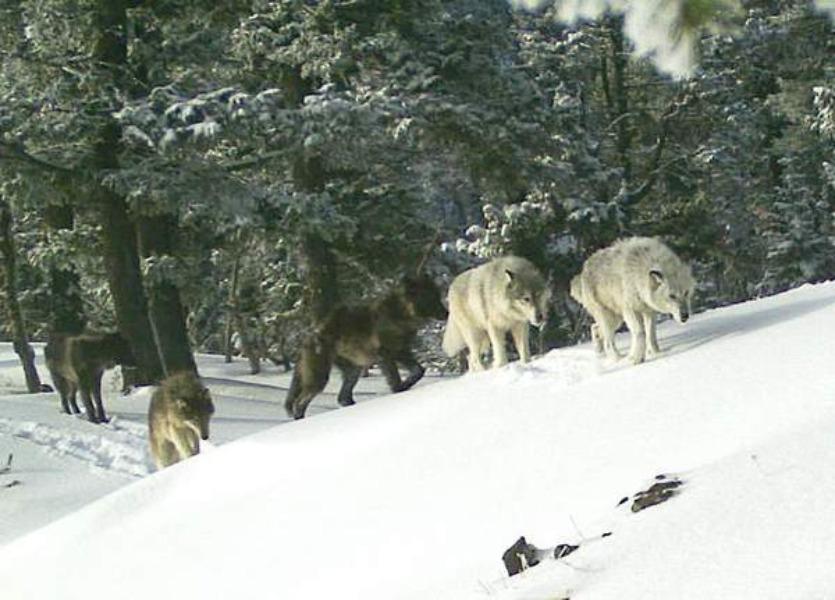
A pack of wolves makes their way through the snow in Northeastern Oregon.
Courtesy of the Oregon Department of Fish and Wildlife
Oregon ranchers are once again calling for local authorities to get the final say over what's considered a wolf depredation.
The request came Friday as part of public testimony over the state's updated wolf plan at an Oregon Department of Fish and Wildlife commission meeting in Portland.
Currently, the Oregon Department of Fish and Wildlife leads investigations to determine whether dead livestock were killed by wolves.
There is a lot at stake when it comes to determining whether a dead cow or other livestock was killed by a wolf. It factors into whether the owner will receive compensation from the government for the loss. And it can determine whether the state will authorize the killing of a wolf pack that's been found responsible for too many livestock deaths.
Eastern Oregon ranchers like Joseph's Jill McLaren say some cases take too long to get started — and they think evidence is being missed. She showed slides of a calf she believed was killed by wolves. Oregon Fish and Wildlife staff determined it was not.
“No one was available to investigate in a timely manner,” she said. “We understand ODFW is doing the best they can and that they are out of town. But wolves do work on the weekends.”
She and other ranchers want a program that certifies local authorities such as county sheriffs to make the final determination on-scene. Their ask comes as state officials prepare to increase the number of depredations that must be confirmed before wolves can be killed.
Russ Morgan, the state's wolf coordinator, said because the decisions affect how the state manages wolves, ODFW has the final say.
While local officials might be available to investigate depredations more swiftly, ODFW’s wolf biologist have training specific to spotting the signs of a wolf kill.
“It’s really about a level of rigor that we use to be sure, if we say there's depredation it needs to be depredation,” Morgan said. “Ultimately, ODFW should be the agency that is doing management actions and ultimately that responsibility falls to us.”
Morgan said the agency does work to train local authorities and that he expected the ODFW commission would consider the concept of a local certification.
Several environmental groups also testified at the meeting, and expressed concerns over the fact that under the new wolf plan livestock deaths ruled probable but not confirmed to be wolf-related could be used to justify the killing of wolves.
Quinn Read of Defenders of Wildlife said the wolf plan itself should outline the standard of evidence used in making determinations about wolf kills, to minimize the risk of abuse and ensure consistency regardless of whether ODFW or another agency is making the determination.
